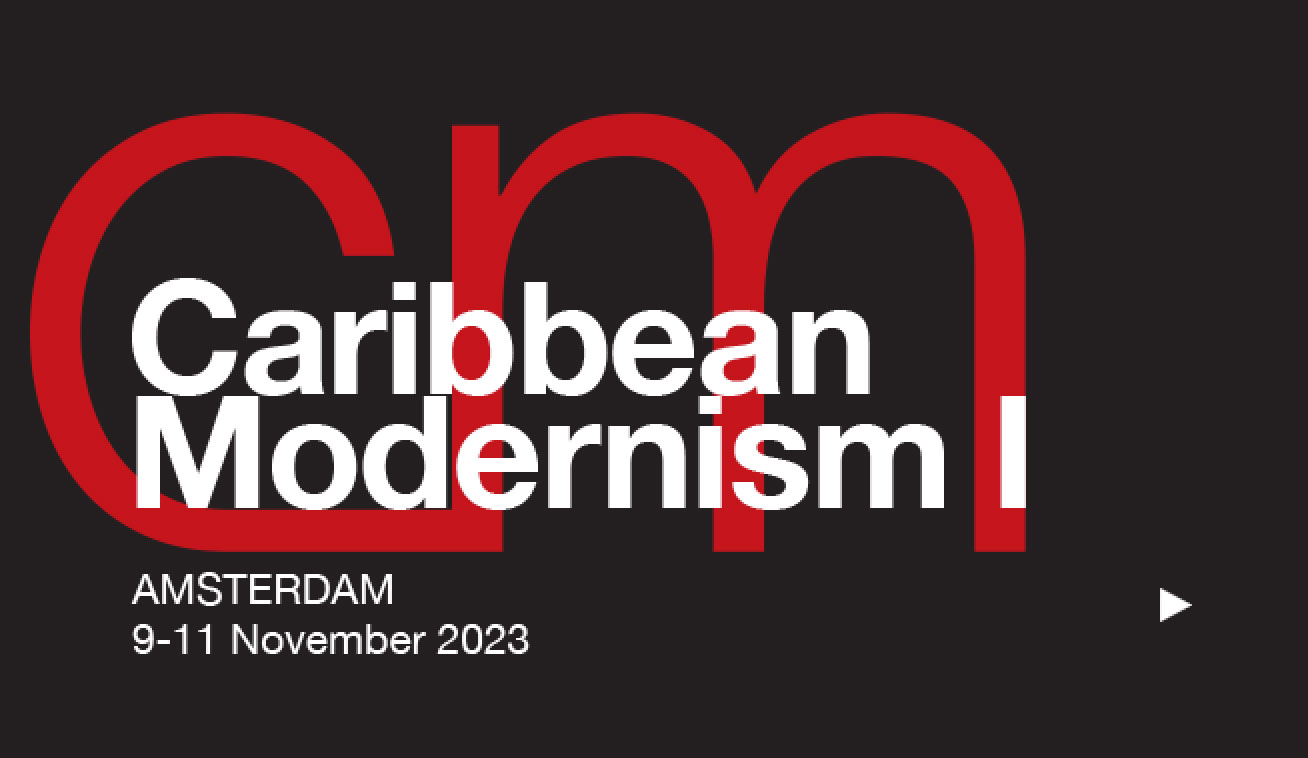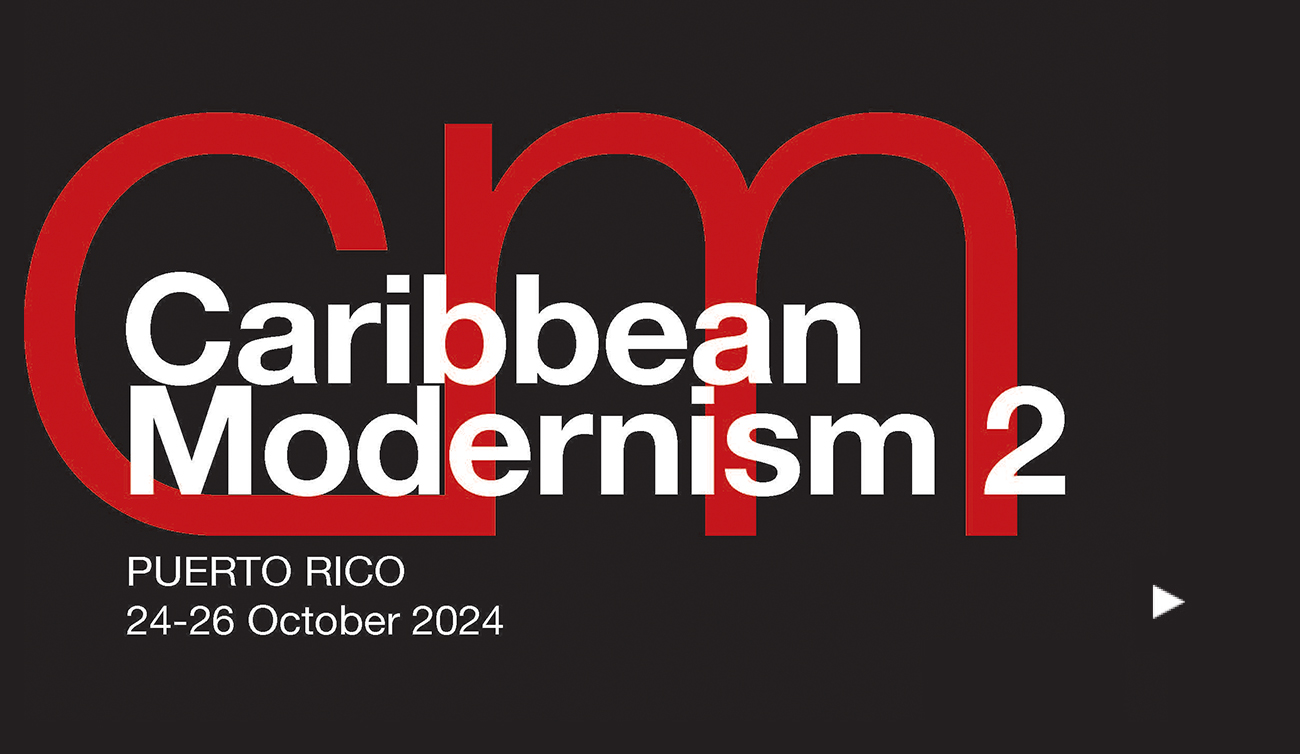caribbean modern
Historically, the geopolitical region we know as the Caribbean is foundationally modern—that is to say, it was forced into being by modern/modernizing colonial powers as a constitutive part of the making of the modern capitalist world. Whatever fragments of indigenous social formation survived the European expansionist onslaught, and whatever fugitive communities of marronage that emerged in its wake, were incorporated in subordinate positions within a terrain of transforming and modernizing economic and state powers. The history of the Caribbean is the story of the struggle with this founding fact. All of us, Caribbeans, in the region or its diasporas, grapple with the powers of the modern, the structural powers of political and economic modernity, as well as the intellectual and aesthetic powers of modernism. This platform, Caribbean Modern, aims to provide an experimental space in which to support and share projects that seek to explore the edges of this condition.
Otto and Hermina Huiswoud:
Modern Black Diasporic Radicals
8 - 9 September 2023
In the history of Black internationalism, few trajectories involve as many sites of political organizing as those of Hermina and Otto Huiswoud. Hermina participated in organizations spanning from the Harlem Tenants League in New York to the Lenin Institute in Moscow. And while Otto remains principally remembered as the only Black person present at the founding meeting of the Communist Party USA, he also spearheaded recruitment campaigns in the Caribbean, and made his mark as chair of the Vereniging Ons Suriname (“Our Suriname Association”) in Amsterdam after WWII. On September 8–9, 2023, Small Axe, The Black Archives, the International Institute of Social History, and the Tropenmuseum will organize a symposium in Amsterdam that brings together an international set of scholars discussing questions do to with the Huiswouds’ relationship to Pan-Africanism, their work for radical publications such as The Negro Worker and organizations such as International Trade Union Committee of Negro Workers, their legacy in the contemporary Dutch Caribbean, and their archive at The Black Archives in Amsterdam.
Coordinator: Mayaki Kimba
Acknowledgement:
This symposium was supported by the following institutions:
The Mellon Foundation, World Museum, Research Center for Material Culture, and Small Axe Inc.
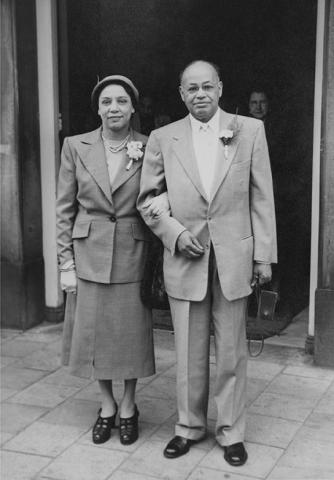
Hermina and Otto Huiswoud posing at the wedding of Surinamese anticolonial nationalist George H. Günther, 1955. Hermina Dumont Huiswoud Papers and Photographs, TAM 354, box A003, folder 10, Tamiment Library/Robert F. Wagner Labor Archives, New York University.
In Modernism’s Wake:
Styles and Infrastructures of Caribbean Artistic and Intellectual Practice
Arguably, across a range of expression and identity, artistic as well as intellectual, modernism has been a shaping force in the twentieth-century Caribbean. If European high modernism partly nourished itself on its imperial connection (primitivism), so also did the vernacular modernisms of the colonial world find their voices by appropriating, indigenizing, creolizing, transforming the forms and languages of modernism. Founded as it was, as a geopolitical region, within modern structures of power—colonial slavery and indenture—the problem of modernity is native to the Caribbean. Not surprisingly, therefore, across the regional and diasporic Caribbean modernism contributed to the modes of radical artistic and intellectual response to colonial domination, dispossession, and oppression, providing some of the idioms and styles and infrastructures through which the politics and poetics and aesthetics of self-determination was articulated. In the last three decades or so, however, with the waning of postcolonial sovereignty and the rise of globalization, there is reason to doubt that modernism continues to be the subversive force that it was for so long taken to be. This is the arena of our project. Our aim is to understand the role of visual, literary, and intellectual modernism in the twentieth-century Caribbean, regional and diasporic, and as a corollary, to explore whether or to what extent modernism’s heretical energies continue to be a significant point of reference.
What and When was Caribbean Modernism?
A Symposium
9 - 11 November 2023 / Amsterdam
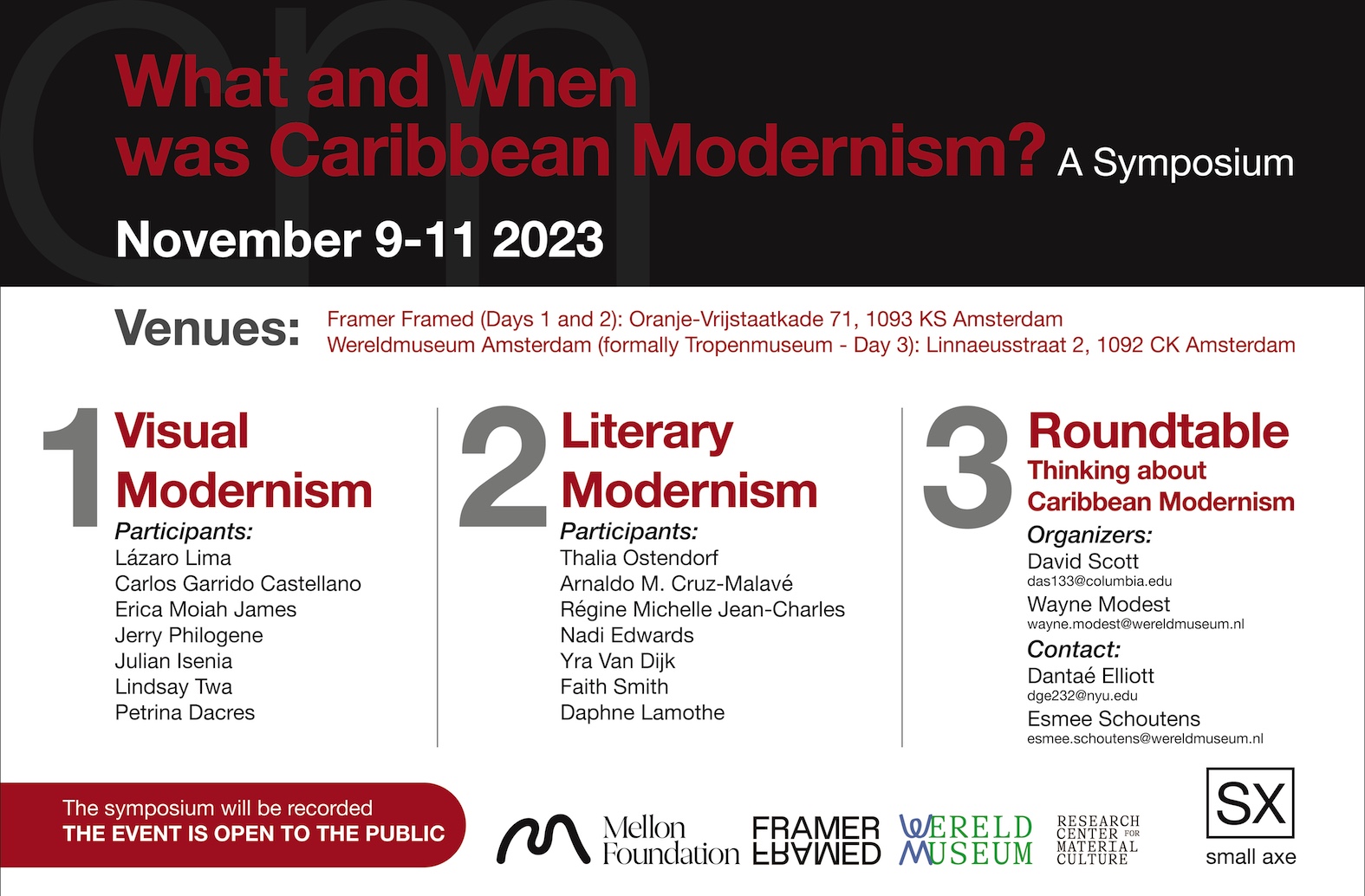
This occasion seeks to capture something of the varied temporalities and idioms of modernism as these emerged and manifested themselves across the Hispanophone, Francophone, Dutch, and Anglophone Caribbean (including their diasporas). Day one will be devoted to visual modernism, and day two to the literary.
Coordinator: Dantaé Elliott
This occasion seeks to capture something of the varied temporalities and idioms of modernism as these emerged and manifested themselves across the Hispanophone, Francophone, Dutch, and Anglophone Caribbean (including their diasporas). Day one will be devoted to visual modernism, and day two to the literary.
Coordinator: Dantaé Elliott
Acknowledgement:
This symposium was supported by the following institutions:
The Mellon Foundation, World Museum, Research Center for Material Culture, and Small Axe Inc.
DAY ONE
Opening remarks
Unraveling Modernity in the Dutch Caribbean: The Struggles of Frank Martinus Arion, Postcolonial Intellectual, and Author
Beyond Vodou Iconography: Luce Tumier, A Haitian Modernist
Meeting Modernism: Haitian Art, Black Diasporan Art Histories, and Pan-African Festivals
The Black Eyes of Modernism
Seeing Modernism, Intuiting Futurity: On the Visual Cultures of the Caribbean Sensorium
Allora & Calzadilla and the Planetary Consequences and Afterlives of Modernism
DAY TWO
Opening remarks
Dutch-Caribbean Modernism: Post from the start
Conduits of Memory
Fuge and Fugitivity/Form and Formalism: M. NourbeSe Philips Zong!
Driving the Wildebus: Creolising Movew in Dutch Caribbean Literature
In the Wake of Modernism, not a Moda but a Modo: Agency, Temporality, and Performance in Caribbean Modernist Projects
Haitian Feminist Texts and the Contradictions of Modernity
The Sphere of the Marvelous: Caribbean Modernism in the World
Dialogues in Caribbean Modernism:
A Symposium
24 - 26 October 2024 / San Juan, Puerto Rico

Dialogues in Caribbean Modernisms is the second iteration of the Small Axe Caribbean Modernisms project. It brings writers and visual artists (of different generations) into conversation with intellectuals and scholars to think about the impact of "modernism" (as style, as ethos, as value, as vocabulary, as infrastructure) on the arts across the regional and diasporic Caribbean.
Convenors: David Scott and Vanessa Pérez-Rosario
Caribbean Modernism 2 consisted of dialogues with Caribbean writers and artists over three days. The aim was simply to listen to these writers and artists and to hear the ways in which modernism, and issues related to modernism, shaped (or not) their creative practice.
Acknowledgement:
The Small Axe Project wishes to thank The Mellon Foundation for funding this endeavor, and Centro de Investigación y Archivo Virtual, PRAFRO, University of Puerto Rico, Río Piedras
DAY ONE - OCT 24
Mayra Santos-Febres / Vanessa Perez-Rosario
Remy Jungerman / Wigbertson Julian Isenia
Jean "Baco" Ortiz / María Elba Torres
Mafalda Mondestin / Jerry Philogene
DAY TWO - OCT 25
Vanessa Pérez-Rosario - Opening remarks
Diógenes Ballester / Zaira Rivera
Jason Allen-Paisant / Loretta Collins Klobah
Roberta Stoddart / Erica Moiah James
Évelyne Trouillot / Régine Jean-Charles
Carmen Haydée Rivera and Jerry Philogene - Closing remarks
DAY THREE - OCT 26
Mapping Decolonial Berlin
A Moses März Project
November 00 - 00, 2024
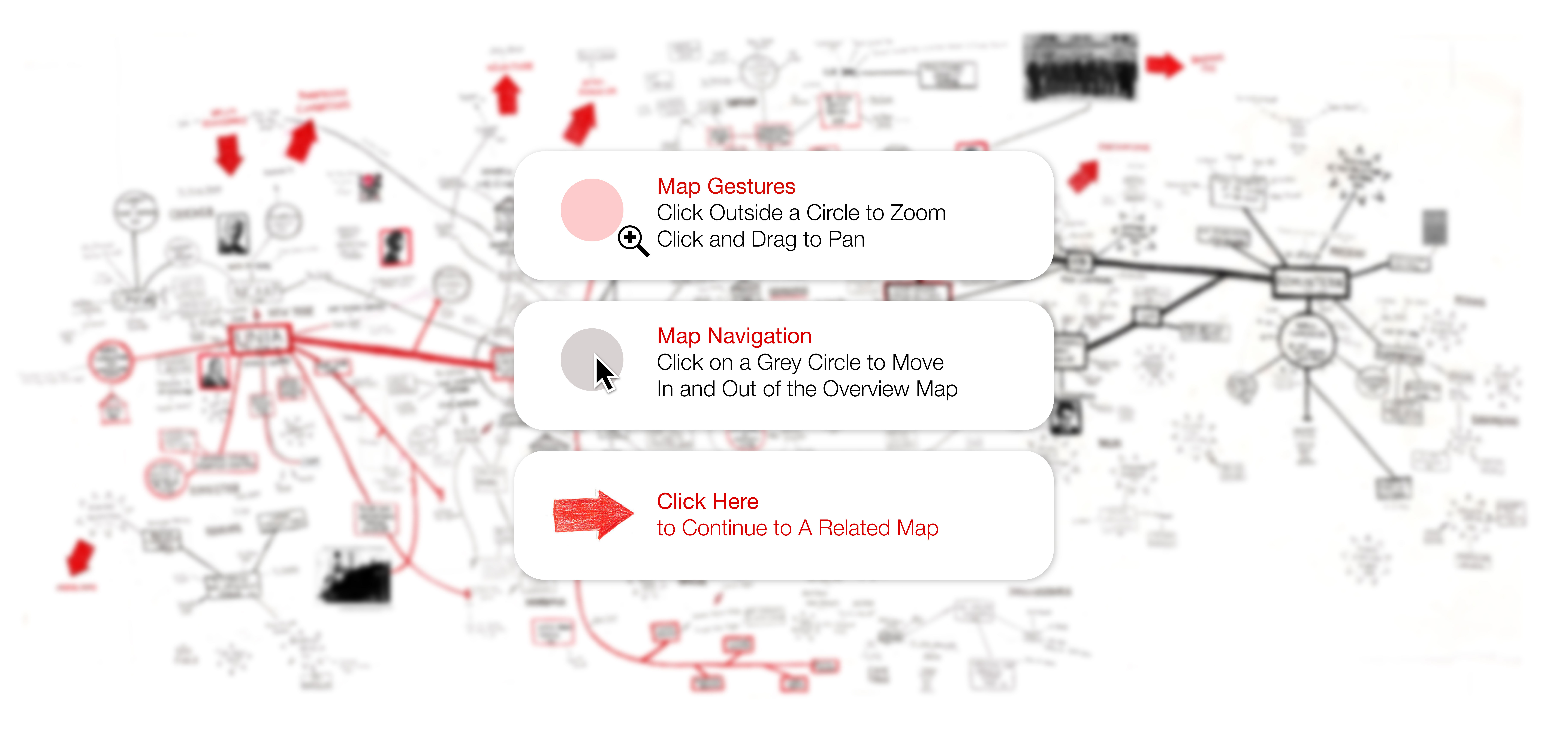
This image is granted with the permission of the artist. No part of this image can be used without the consent of the artist.
© Copyright 2023
In his cartographic practice Moses März translates reading notes from academic and literary texts into lines, images, symbols, and quotations. This method of combining scholarly research with elements from the verbal and visual arts developed out of his collaboration with the editorial team of the Chimurenga Chronic—a Pan-African literary magazine based in Cape Town, South Africa—and his engagement with Édouard Glissant’s philosophy of relation.
The Mapping Decolonial Berlin series is an ongoing artistic research project focusing on the intersecting histories of decolonial movements in and around the city of Berlin. They chart the continuities and changes shaping the German variant of the coloniality of power and the diverse alliances of force resisting it. The maps shown here were produced between 2021 and 2023 in collaboration with the Dekoloniale Memory Culture in the City initiative in Berlin. Each map is linked to other maps via big red arrows.
Map 1 traces alliances between anticolonial movements that were active in the period between the two world wars. Its main focus is on initiatives that were based in Berlin and Hamburg (centre) and were strongly influenced or supported by Marcus Garvey’s black nationalist project (red) and the Communist International (black) and its commitment to support anticolonial movements. These two currents met at the founding congress of the League Against Imperialism and Colonial Oppression in 1927 (red and black circle), which is considered a predecessor of the Bandung Conference of 1955.
Robbie Aitken and Eve Rosenhaft. Black Germany: The Making and Unmaking of a Diaspora Community, 1884-1960, Cambridge University Press, 2015
Tania Schlie and Simone Roche. Willi Münzenberg (1889 – 1940): Ein deutscher Kommunist im Spannungsfeld zwischen Stalinismus und Antifaschismus. Lang, 1995
Brent Hayes Edwards. The Practice of Diaspora: Literature, Translation, and the Rise of Black Internationalism. Harvard University Press, 2003
Judith Stein. The World of Marcus Garvey: Race and Class in Modern Society. Louisiana State University Press, 1991
Michele Louro, Carolien Stolte, Heather Streets-Salter, and Sana Tannoury-Karam (eds.). The League against Imperialism: Lives and Afterlives. Leiden University Press, 2020
David Murphy. ‘Defending the “Negro Race”: Lamine Senghor and Black Internationalism in Interwar France’. French Cultural Studies, vol. 24, no. 2, May 2013, pp. 161–73
Daniel S Davis. Marcus Garvey. F. Watts, 1972
Hans Piazza (ed). Die Liga gegen Imperialismus und für nationale Unabhängigkeit (1927-1937): zur Geschichte und Aktualität einer wenig bekannten antikolonialen Weltorganisation: Protokoll einer wissenschaftlichen Konferenz am 9. und 10. Februar 1987 an der Karl-Marx-Universität Leipzig, Karl-Marx-Universität, 1987
Map 2 shows the Afro-Asian movement that began with Indian independence in 1947, gained momentum at the Bandung Conference in 1955, and eventually dissipated in Cuba in 1966. The map offers a South-South focused geopolitical perspective that cuts across racialized divisions between Sub-Saharan Africa, North Africa, the Caribbean and Asia. It also shows how closely the German Democratic Republic was woven into the project of Afro-Asian solidarity via relations of exchange and support that the grey arrows on the map indicate.
Gareth M. Winrow. The Foreign Policy of the GDR in Africa. Cambridge University Press, 1990
Lena Dallywater et al. (eds.). ‘Hubs of Decolonization. African Liberation Movements and “Eastern” Connections in Cairo, Accra, and Dar Es Salaam’. Southern African Liberation Movements and the Global Cold War ‘East’, De Gruyter Oldenbourg, 2019, pp. 25–56
Eric Burton et al. (eds). Navigating Socialist Encounters: Moorings and (Dis)Entanglements between Africa and East Germany during the Cold War. De Gruyter, 2021
David Kimche. The Afro-Asian Movement: Ideology and Foreign Policy of the Third World. Israel Universities Press; Halsted Press, 1973
Achim Reichardt. Nie Vergessen: Solidarität üben! Homilius, 2006
Alexandre Kum’a Ndumbe III. Was will Bonn in Afrika? Zur Afrikapolitik der Bundesrepublik Deutschland, Centaurus-Verl.-Gesellschaft,1996
Kien Nghi Ha (ed.). Asiatische Deutsche Extended: Vietnamesische Diaspora and Beyond, Assoziation A, 2021
Anselm Franke, Nida Ghouse, Paz Guevara and Antonia Majaca (eds.) Parapolitics: Cultural Freedom and the Cold War. Haus der Kulturen der Welt ; Sternberg Press, 2021
Christian Saehrendt. Kunst im Kampf für das ‘Sozialistische Weltsystem’: Auswärtige Kulturpolitik der DDR in Afrika und Nahost. Franz Steiner Verlag, 2017
Map 3 traces the intersecting lifelines of Audre Lorde (black line), her publisher and friend Dagmar Schultz (grey line) and the Afro-German poet May Ayim (red line) in mid-1980s Berlin. Along with their comrades they had a powerful effect on the creation of several organizations, events and publications that are considered of fundamental importance for the Afro-German community. Among the initiatives that emerged from this Afro-feminist movement are organizations such as Schwarze Frauen in Deutschland e.V. (ADEFRA) and Schwarze Menschen in Deutschland e.V. (ISD) that have paved the way for contemporary initiatives in Berlin such as Each One Teach One (EOTO) and Dekoloniale Memory Culture in the City.
May Ayim. Blues in schwarz-weiss: Gedichte, Orlanda-Frauenverl, 1996
Kaharina Oguntoye and May Ayim (eds.). Farbe bekennen: afro-deutsche Frauen auf den Spuren ihrer Geschichte. Orlanda, 1986
Linton Kwesi Johnson. More Time. LKJ Records LTD, 1998
May Ayim. Grenzenlos und Unverschämt, Unrast, 2021
Audre Lorde. Sister Outsider. Penguin Books, 2019
Audre Lorde. Dream of Europe: Selected Seminars and Interviews: 1984-1992. Edited by Mayra Rodríguez Castro, Kenning Editions, 2020
Kien Nghi Ha, et al. (eds.) re/visionen: postkoloniale Perspektiven von People of Color auf Rassismus, Kulturpolitik und Widerstand in Deutschland, UNRAST-Verlag, 2016a
Stella Bolaki and Sabine Bröck-Sallah (eds.). Audre Lorde’s Transnational Legacies. University of Massachusetts Press, 2015
Dagmar Schultz (dir.). Audre Lorde – Die Berliner Jahre 1984-1992, Third World Newsreel, 2012
Maria Binder (dir.). May Ayim: Hoffnung im Herz. Third World Newsreel, 1997
Maureen Maisha Auma, et al. (eds.) ‘‘Reclaiming Our Time’ in African Studies: Conversations from the Perspective of the Black Studies Movement in Germany’. Critical African Studies, vol. 12, no. 3, Sept. 2020, pp. 330–53
Oumar Diallo and Joachim Zeller (eds.) Black Berlin: Die deutsche Metropole und ihre afrikanische Diaspora in Geschichte und Gegenwart. Metropol, 2013
Chimurenga Chronic, imagi-nation nwar, Chimurenga, 2021
Elsa Dorlin and Myriam Paris. ‘Les Hétérotopies Du Féminisme Noir’. Comment s’en Sortir ?, vol. 1, 2015, pp. 56–90
Cathy S. Gelbin et al. (eds.). AufBrüche: kulturelle Produktionen von Migrantinnen, Schwarzen und jüdischen Frauen in Deutschland. Helmer, 1999
Map 4 provides a schematic overview of the conflict between the coloniality of power (black) and decolonial movements (red) over the course of more than 500 years. It focusses particularly on the history of German colonialism (area enclosed by dashed line) and on Black movements of resistance operating in and around Berlin since the 1980s (upper right side). The red arrows on the sides of the map indicate transnational exchanges of theories and cultural practices that had an impact on this local decolonial tradition.
Adetoun Küppers-Adebisi and Michael Küppers-Adebisi. ‘Afrofuturistischer Kampf der Narrative - Vor dem Gesetz, the Long Centuries’. Koloniale Vergangenheit-Postkoloniale Zukunft? Die Deutsch-Namibischen Beziehungen Neu Denken, Brandes & Apsel, 2022, pp. 137–64
Édouard Glissant, Le discours antillais, Le Seuil, 1981
Chimurenga Chronic, On Circulations and the African Imagination of a Borderless World, Chimurenga, 2018
Moses März, Karten zur Kreolisierung der Welt and The Marvelous Arithmetics of Proximity and Distance oder Decolonial Reading Notes (Out of Berlin), Mittel und Zweck, 2022
Alexander Honold and Klaus R. Scherpe (eds.), Mit Deutschland um die Welt: Eine Kulturgeschichte des Fremden in der Kolonialzeit, J.B. Metzler, 2004
Afro-Asian Solidarity Committee in the GDR, The Neocolonialism of the West-German Federal Republic: A Documentation, 1965
Kien Nghi Ha, ed., Asiatische Deutsche Extended, Vietnamesische Diaspora and Beyond, Assoziation A, 2012
Robbie Aitken, ‘Berlin’s Black Communist’, Rosa Luxemburg Stiftung, 2019
Manuela Bauche, ‘Walking the Line’, Kulturstiftung des Bundes Magazin, 36, 2021
Mareike Heller et al. (eds.), No Humboldt 21! Dekoloniale Einwände gegen das Humboldt-Forum, AfricAvenir International e.V., 2017
Natasha A. Kelly, Afrokultur: ‘Der Raum zwischen gestern und morgen’, Unrast, 2021
Murat Güngör and Hannes Loh, Fear of a Kanak Planet: HipHop zwischen Weltmusik und Nazi-Rap, Hannibal, 2002
Léonora Miano, Afropea: Utopie post-occidentale et post-raciste, Bernard Grasset, 2020
Jürgen Zimmerer, Von Windhuk nach Auschwitz? Beiträge zum Verhältnis von Kolonialismus und Holocaust, Lit Verlag, 2011
Ayi Kwei Armah, Wat Nt Shemsw: Myth, Histroy, Philosophy and Literature, the African Record, Per Ankh, 2018
Souleymane Bachir Diagne, The Ink of the Scholars: Reflections on Philosophy in Africa, CODESRIA, 2016
This map is part of the Caribbean Modernism project and we acknowledge the support of the Mellon Foundation 

